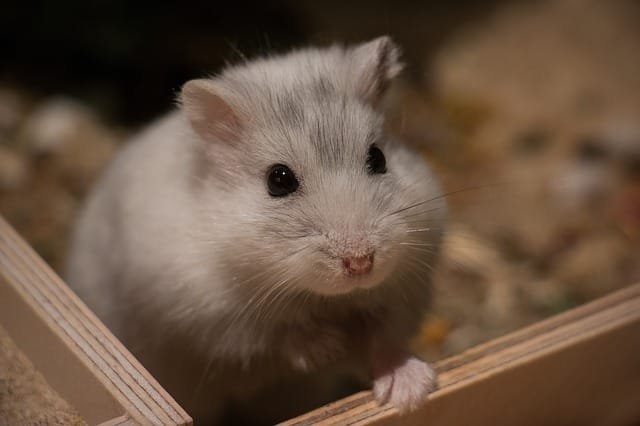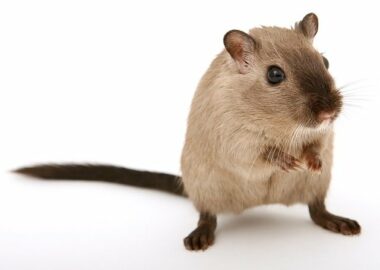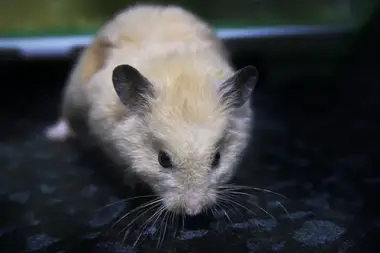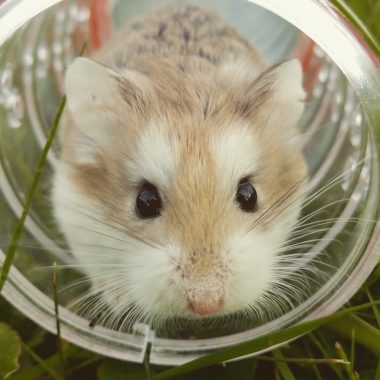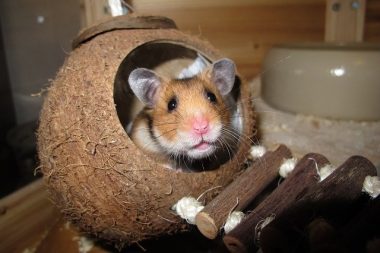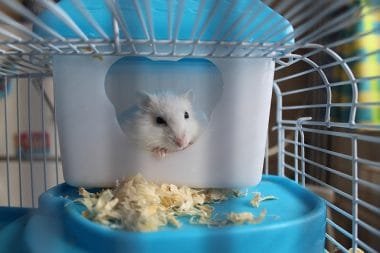Table of Contents Hide
Hamsters are great household pets. But they do require a good amount of care and work. Some days you may notice that your otherwise healthy furry friend has the sniffles. Or you may hear your hamster make a sound similar to hiccupping and you might wonder why is my hamster sneezing?
Just like any other animal, hamsters sneeze when they experience some irritation in their nasal passages. Sneezing is the body’s way of trying to get the irritation out of the nasal passage. While the occasional sneeze may not raise much concern, consistent sneezing accompanied by eye or nasal discharge could be a sign of something more serious that may require attention.
Hamsters, like most mammals, can develop a cold. But unlike humans, the ‘cold’ in hamsters is not actually a cold. It is an upper respiratory tract condition that may be brought on by a number of different factors. Various reasons may trigger sneezing in your hamsters. If you are looking to figure out why is my hamster sneezing, it could be one or a combination of factors. These include dust or allergens in the environment, food particles in the nasal passage, or Upper Respiratory Tract Infections. Changes in food, climate, or more serious illnesses such as pneumonia could also contribute to your pet’s sneezing.
Hamsters have extremely sensitive gastrointestinal systems. Changes in their diets and environments can not only cause stress but also affect their immune system and make them susceptible to infections and allergies. If you notice your hamster sneezing, be sure to observe your pet and consult a vet to understand the underlying reasons for your hamster’s sniffles. Here, we look at the various reasons why your hamster may be sneezing and offer some tips to nurse your little friend back to good health in no time.
Why is My Hamster Sneezing?
If you’ve noticed your hamster making hiccupping sounds or pawing at its face, then look out for signs of a ‘cold’ or allergy. Hamsters can get respiratory tract infections that are symptomatically similar to the human cold. These infections are not only contagious, but your hamster can actually catch a ‘cold’ or an infection from you! So if you find yourself to be sick, make sure to take your medication and distance yourself from your furry companion to avoid passing on any infection.
Alternately, hamsters can also get sick from changes in weather such as the onset of winter or from allergens in the environment. Allergens are difficult to determine because just like humans, a number of different factors in your hamster’s environment or diet could be the cause for your little pet to fall sick. It’s best to consult your veterinarian doctor to find out what is causing the sneezing in your hamster so that you’ll be able to better deal with it. Let’s look at some of the reasons that may help you answer this troubling question of why is my hamster sneezing.
Reasons for Sneezing in Hamsters
Respiratory Tract Infection
Unlike humans, when hamsters are said to catch a cold, they actually have a respiratory infection. These infections look similar to the human cold. They cause sneezing, nasal discharge, runny or crusty eyes, lethargy, and decreased appetites in hamsters. These infections can be caused by bacteria from the environment, food, or another sick and contagious hamster. Respiratory tract infections will require a vet visit and prescription antibiotics to treat. You must be careful to not neglect such infections as they can develop into life-threatening pneumonia.
Allergies
If a respiratory infection is not the cause for sneezing, then turn to look at what in your hamster’s environment could be causing it to sneeze. When trying to figure out why is my hamster sneezing, you may want to look for potential allergens in your hamster’s environment or food. Since we usually do not test hamsters for allergies, potential reasons for sneezing could include many different items. Here is a list of allergens that might be irritating your hamster and causing it to sneeze.
· Harsh detergents or scented fabric softeners used to clean the bedding, fleece blankets, and towels
· Cedar or pine shaving beddings
· Dust and microscopic dust mites
· Certain ingredients in hamster food or treats
Hamsters are particularly sensitive to elements in their environment. If their linen and bedding are washed with harsh detergents or scented fabric conditioners, then try switching to softer unscented detergents and fabric conditioners. Alternatively, if you have recently changed your hamster’s diet to a new brand or included a new food item, your hamster could be allergic to one of the ingredients.
The essential oils and fragrance of wood shaving beddings can also be potential irritants to your hamster. Try switching over to paper or recycled paper beddings for your little friend.
Dust and dust mite allergies are difficult to eliminate completely. You can try using a HEPA filter in your home to purify the air and reduce irritation for your hamster. Your vet will also prescribe a course of antihistamines to control food, dust, and dust mite allergens. Do not administer antihistamines without consulting your vet first! Antihistamines can lead to different side effects and must be used only under a vet’s prescription.
Exposure to allergens can cause serious respiratory problems for your hamster. Be sure to observe carefully and determine the underlying reason why your hamster may be sneezing.
Respiratory Irritants
A wide range of products that you may use in your home can cause your hamster to sneeze. These products are respiratory irritants and can include perfumes, air fresheners, diffusers, humidifiers, scented candles, scented room sprays, and various cleaning agents. Try minimizing the use of these respiratory irritants near your hamster’s cage and playpen or use them in another room altogether.
When cleaning your hamster’s cage, toys and playpen, avoid using any harsh chemicals, bleach, or detergents. Some anti-bacterial cleaners can also be harsh and irritate your pet’s respiratory tract. Instead, switch to warm water and mild unscented soap to clean your hamster’s cage and playpen.
Other Hamsters
In a multi-hamster household, other sick hamsters are most likely to pass on contagious infections to healthy hamsters. This is especially true if your hamsters share a cage, playpen, bedding and linen, and even food and water dishes.
Hamsters who fight may even pass on infections to one another. Their tiny sharp nails and teeth and can bit or tear into another’s skin and pass on bacteria through infected wounds. When you notice one of your hamsters getting sick, it is best to separate and isolate the sick hamster in another cage or room. Isolate the hamster till it gets better before re-introducing it to the other healthy hamsters.
Other Reasons why Your Hamster may be Sneezing
Some of the other common reasons why your hamster is sneezing may be if his cage is placed in a cold room with a draft coming in. If your hamster has just had a bath and isn’t dry completely, he is most like going to fall sick. Hamsters may also catch the sniffles if they sleep under their water dispensers or near their water bowls. Water spillage may cause their bedding to get moist and cause your hamster to fall sick.
There are some uncommon, but potentially serious reasons for the sniffles in your hamster. A small animal vet will be best able to diagnose these reasons. They include:
· Pneumonia
· Cheek pouch irritation or infection
· Dental irritation or infection
· Cancer
· Tumor growths in the head and/or nose
Tumors in the head or nose are life-threatening and require immediate attention. Since most people hesitate to get an MRI for such a small animal, pay close attention to the signs and symptoms of the illness. Sneezing accompanied by bloody discharge is a sign of some serious underlying illness.

Common Symptoms of Respiratory Illness in Hamsters
Sneezing is the first sign or symptom that tells you that your hamster is sick or needs medical attention. But sneezing may be accompanied by a range of different symptoms that may help you figure out the best course of action to help your furry companion get back to good health. Symptoms of respiratory infection or allergies include:
· Decreased appetite
· Lethargy and/ or fatigue
· Lack of activity
· Warm body temperature
· Breathing difficulties
· Increased sleep
· Dull or matted fur
· Runny nose or nasal discharge
· Crusty or sealed eyes
· Scratching or itching
· Shivering
· Weight loss
It is important to pay attention to the symptoms to find out what may be causing your hamster to be sick. It is best to catch the sickness early on rather than later as respiratory infections can lead to pneumonia. Pneumonia is a serious and life-threatening lung infection that can be fatal for your hamster is not treated early on.
What Can You Do To Stop Your Hamster from Sneezing?
If your hamster is showing signs and symptoms of a severe allergy or respiratory infection, it is important to consult your vet immediately. Your vet will be able to provide relief from the symptoms and prescribe a course of antihistamines or antibiotics. These medicines will help to help alleviate and manage the symptoms of the allergy or infection respectively. Ensure regular vet visits to keep your hamster healthy.
There are also everyday practices you can observe to keep the sniffles at bay. Ensure that your hamster is litter trained. Pee and poop or waste build-up in the cage can increase the amount of ammonia in your hamster’s environment and cause irritation. Make sure to use unscented bedding and linen that is washed using soft detergents and unscented fabric conditioners. Deep clean the cage, playpen, toys, and feeding and drinking stations once a month using warm water and unscented soap.
Clean the room that your hamster’s cage is kept in frequently. Keep the cage away from the door or window and prevent drafts of cold air from coming in. If your hamster is sick, isolate him and avoid giving him a bath. Use an air purifier or a humidifier to ease sneezing and congestion. Alternatively, if you are sick, ensure that you take your own medications and distance yourself from your hamster until you recover.
Since hamsters are sensitive creatures, ensure a well-balanced and nourishing diet that will boost and strengthen their immunity. A strong immune system is bound to keep bacterial infections at bay and help your little friend recover faster. These simple practices will ensure that your hamster is in the best of health every day!
